Generic drugmakers seen to benefit from UHC law
HEALTHCARE providers and generic drugmakers are seen to benefit from the passage of the universal health coverage (UHC) bill in the country, as more Filipinos will now have better access to health services.
This is according to an industry trend analysis report by Fitch Solutions, which highlighted that the healthcare bill approved by the Senate in October last year brings the country a step closer to implementing universal healthcare coverage.
“Broadly, such schemes reduce out-of-pocket spending and correspondingly drive higher utilization of medical services — and hence pharmaceutical consumption in the region,” according to Fitch Solutions.
The Universal Health Coverage bill, which was approved by the bicameral conference committee last November, seeks to enroll all citizens under the National Health Insurance Program as either direct or indirect contributors. This means that low-income earners, pensioners, or those on welfare will be paid for by the government, while those with the capacity to pay should pay premiums in exchange for more benefits.
The bill will also create a Health Technology Assessment Council, which will be tasked to craft recommendations for policies and programs, and to determine the Philippine Health Insurance Corporation benefit packages.
“Although the government is set to play a greater role in the health sector as part of the universal healthcare programme, the expansion of coverage and services is also expected to open the door for increased private sector participation,” Fitch Solutions said.
For instance, manufacturers of generic drugs are likely to benefit further from the passage of the bill, since it will require drug outlets to carry the generic version of all drugs in the Primary Care Formulatory at all times.
The government already requires all public hospitals to prescribe generic versions of medicine to their patients, through the Generics Act of 1988. Generic medicines are typically 50-70% lower than their branded counterparts.
With this, Fitch Solutions projects that generic medicine will expand its market share in the coming years, with generic drug sales estimated at P97.3 billion by 2022. This indicates a compounded annual growth rate of 5.7% from the 2017 figure of P73.7 billion, or a total market share of 45.44%.
Challenges to providing healthcare services to all Filipinos however will still be met with uncertainties, according to Rajan Kumar, the general manager of global healthcare firm Novo Nordisk’s local unit.
Fitch Solutions reported Mr. Kumar as saying that factors such as lack of human resources, poor patient access to clinics and hospitals, as well as limited insurance coverage will hold back the healthcare sector’s growth. — Arra B. Francia



